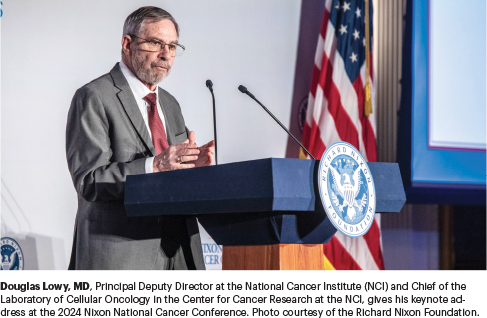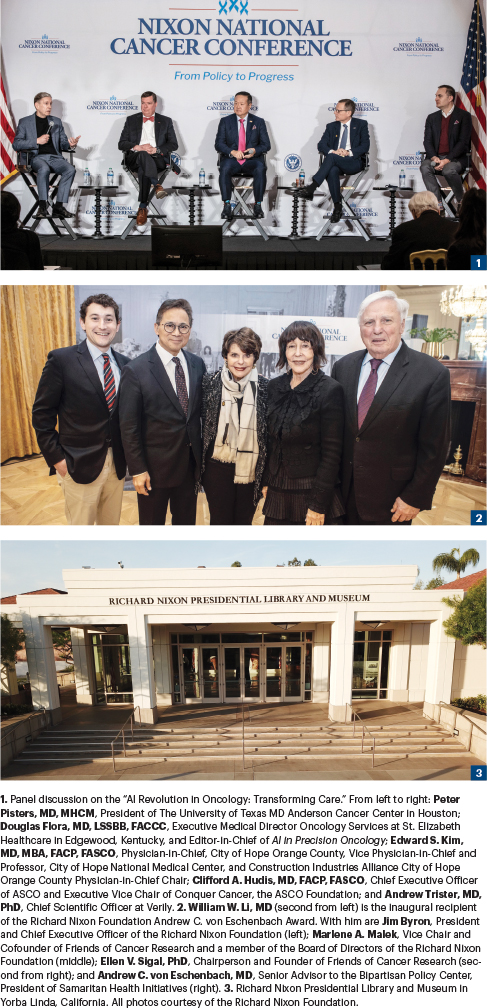For the third year in a row, more than 250 leaders in cancer care, including cancer center directors, physicians, scientists, ethicists, journalists, public officials, and patient advocates, gathered at the Richard Nixon Presidential Library and Museum in Yorba Linda, California, to attend the Nixon National Cancer Conference, held January 17–18, 2024. Launched in December 2021 to mark the 50th anniversary of the signing of the National Cancer Act of 1971, this year’s conference focused on what lies ahead in cancer research, treatment, and care.
Among the highlights of the conference was the keynote address by Douglas Lowy, MD, Principal Deputy Director at the National Cancer Institute (NCI) and Chief of the Laboratory of Cellular Oncology in the Center for Cancer Research at the NCI. During his presentation, “Developing Cancer Research Advances and Disseminating Them,” Dr. Lowy acknowledged that although cancer mortality rates in the United States have been decreasing “at the previously unprecedented rate of more than 2% per year,” not all patients are benefiting equally from advances in cancer treatments, especially those living in rural parts of the country.

“People who live in rural areas are just not benefiting to the same degree from the advances in cancer research for lung cancer treatment as people in urban areas,” said Dr. Lowy. This disparity, according to Dr. Lowy, did not exist 20 years ago, when “there was no difference in lung cancer mortality rates in urban vs rural areas.” One reason for the discrepancy in mortality rates between patients living in rural and urban parts of the United States, said Dr. Lowy, is access to high-quality cancer care.
“One of the big challenges we have is figuring out how to be able to bring those advances to all our populations—even to people who live in nonmetropolitan areas,” he said.
Ensuring Equitable Access to Care for All Patients
Achieving health equity was also part of the theme of a panel discussion on “AI Revolution in Oncology: Transforming Care.” Moderated by Peter Pisters, MD, MHCM, President of The University of Texas MD Anderson Cancer Center in Houston, the panel members included Clifford A. Hudis, MD, FACP, FASCO, Chief Executive Officer of ASCO and Executive Vice Chair of Conquer Cancer, the ASCO Foundation; Douglas Flora, MD, LSSBB, FACCC, Executive Medical Director Oncology Services at St. Elizabeth Healthcare in Edgewood, Kentucky, and Editor-in-Chief of AI in Precision Oncology; Edward S. Kim, MD, MBA, FACP, FASCO, Physician-in-Chief, City of Hope Orange County, Vice Physician-in-Chief and Professor, City of Hope National Medical Center, and Construction Industries Alliance City of Hope Orange County Physician-in-Chief Chair; and Andrew Trister, MD, PhD, Chief Scientific Officer at Verily.
“The fundamental problem is that only 3% to 4%, maybe 5%, of adults enroll in clinical research studies in America, and at a minimum…, that’s a bottleneck in progress.”— CLIFFORD A. HUDIS, MD, FACP, FASCO
Tweet this quote
Ensuring that artificial intelligence in oncology care is used to address issues of equity and bias and that it provides functionality and efficiency for the people who need it the most—the patients and the clinicians—is of paramount concern, according to Dr. Flora.
“What are the problems we are trying to solve today?,” asked Dr. Flora. “We have staffing crises in every single cancer center. We have somewhere between 13,000 and 19,000 oncologists … taking care of 18.1 million survivors. The number of cancer patients goes up 6%, 7%, 8%, 9% per year as we’re graying. And none of these things are about to get better…. We have to work more efficiently. And if these technologies allow us to scale so we can have a physician make better decisions more quickly, have more information available, solve the problems that the patients are actually coming to us with their existential dread and their anxiety, rather than typing on a computer, I’m an enthusiastic optimist,” he said.
Bringing Back the Human Touch in Care
An important next step in the use of the technology is that it “augments what the provider is doing,” said Dr. Kim. “It adds practical value to save time. And that will help with workforce engagement. It will help with burnout. And it will allow people to go back to the ways they want to practice, which is calling your patient with results later instead of having them call and check their Web portal for 3 or 4 days, and maybe even communicating with your peers across systems together to give them updates on what’s happening. These things are automated right now in a very poor way. That’s where I feel AI could come in and bring the core values of medicine back to that patient…, and it will empower our workforce in so many ways.”
Closing the Equity Gap in Access to Research
The panel also tackled the issue of inequity in clinical trial enrollment and how artificial intelligence technology may expedite drug discovery, ultimately helping to improve outcomes for all patients with cancer.
“The fundamental problem is that only 3% to 4%, maybe 5%, of adults enroll in clinical research studies in America, and at a minimum…, that’s a bottleneck in progress,” said Dr. Hudis. “I would also add there is some great promise not yet realized that we should be thinking about on the preclinical side where I do think these tools may be helpful—[specifically] drug discovery and drug development. Here, one could start to at least think about the use of some of these well-trained models for narrowing the range of molecules we might want to explore…. I’m hugely optimistic on the research side that the equity issue will get addressed in ways that are accelerating our elimination of the gap…. We have huge inequities in access to clinical trials and the products they produce. And it seems to me, the low cost of distributing these tools into clinics should serve to reduce those barriers. We’re still going to be left with expensive drugs and treatments, but at least more people will know what they should be getting.”

“[It is] not just the research but the products of the research,” added Dr. Trister. And I think the goal is to have more equitable access: [not just] more drugs, more precision, but the idea that more allows for more people to have cure, ultimately, in oncology,” he said.
Other panel discussions included “Precision Oncology: Tailored Care for Better Outcomes,” which explored the personalized approach to transforming treatment strategies for better patient outcomes; “Navigating the Patient Journey: Insights and Impact,” which emphasized the significance of patient-centric approaches in oncology care; and “The Gut Microbiome in Oncology: A Catalyst for Research Innovation,” which examined how the microbiome shapes cancer development, influences treatment responses, and impacts patient outcomes.
Recognizing Visionaries in Cancer Care
At this year’s Nixon National Cancer Conference, Marlene A. Malek, Vice Chair and Cofounder of Friends of Cancer Research and a member of the Board of Directors of the Richard Nixon Foundation, announced the establishment of the Dr. Andrew C. von Eschenbach Award. Named in honor of Andrew C. von Eschenbach, MD, Senior Advisor to the Bipartisan Policy Center, President of Samaritan Health Initiatives, former Director of the National Cancer Institute, and former Commissioner of the U.S. Food and Drug Administration, the award, said Ms. Malek, is meant to “honor one or more visionaries in the cancer care community who are actively living the legacy of the National Cancer Act.” This year’s recipient of the award is William W. Li, MD, Chief Executive Officer, President, and Medical Director of the Angiogenesis Foundation, and author of Eat to Beat Disease: The New Science of How Your Body Can Heal Itself (Balance, 2019).
Upon receiving the award, Dr. Li shared these comments: “I’m deeply honored to receive this inaugural Dr. Andrew von Eschenbach award. The award underscores the principles and values that have always been at the core of my work, which is bringing cutting-edge science into practice, so we can relieve human suffering from disease and save lives in real time.”

